Logic
Studies in Continental Thought
EDITOR
JOHN SALLIS
CONSULTING EDITORS
Robert Bernasconi | William L. McBride |
Rudolf Bernet | J. N. Mohanty |
John D. Caputo | Mary Rawlinson |
David Carr | Tom Rockmore |
Edward S. Casey | Calvin O. Schrag |
Hubert L. Dreyfus | Reiner Schrmann |
Don Ihde | Charles E. Scott |
David Farrell Krell | Thomas Sheehan |
Lenore Langsdorf | Robert Sokolowski |
Alphonso Lingis | Bruce W. Wilshire |
David Wood
Martin Heidegger
Logic
The Question of Truth
Translated by
Thomas Sheehan

This book is a publication of
Indiana University Press
601 North Morton Street
Bloomington, Indiana 47404-3797 USA
www.iupress.indiana.edu
Telephone orders | 800-842-6796 |
Fax orders | 812-855-7931 |
Orders by e-mail |
Published in German as Martin Heidegger, Gesamtausgabe 21:
Logik: Die Frage nach der Wahrheit (WS 192526), ed. Walter Biemel
1976 German edition by Vittorio Klostermann, Frankfurt am Main
Second edition 1995 by Vittorio Klostermann, Frankfurt am Main
2010 English edition by Indiana University Press
All rights reserved
No part of this book may be reproduced or utilized in any form or by any means, electronic or mechanical, including photocopying and recording, or by any information storage and retrieval system, without permission in writing from the publisher. The Association of American University Presses Resolution on Permissions constitutes the only exception to this prohibition.
 The paper used in this publication meets the minimum requirements of the American National Standard for Information SciencesPermanence of Paper for Printed Library Materials, ANSI Z39.48-1992.
The paper used in this publication meets the minimum requirements of the American National Standard for Information SciencesPermanence of Paper for Printed Library Materials, ANSI Z39.48-1992.
Manufactured in the United States of America
Heidegger, Martin, 18891976.
[Logik. English]
Logic : the question of truth / Martin Heidegger ; translated by Thomas Sheehan.
p. cm. (Studies in Continental thought)
Fifty-three lectures delivered Nov. 5, 1925Feb. 26, 1926 at Philipps-Universitt,
Marburg, Germany.
ISBN 978-0-253-35466-2 (cloth : alk. paper) 1. Logic. 2. Truth. 3. Time. I. Title.
B3279.H48L6313 2010
160dc22
2009039679
1 2 3 4 5 15 14 13 12 11 10
CONTENTS

Translators Foreword

Martin Heidegger delivered the fifty-three lectures titled Logic: The Question of Truth, four days a week from Thursday, 5 November 1925, to Friday, 26 February 1926, at Philipps-Universitt in Marburg. It was during the span of this lecture-course that the dean of the philosophy faculty walked into Heideggers office and told him, You must publish something now. Do you have an appropriate manuscript?
Within a few months he would. As soon as the course ended, Heidegger went off to his cottage in Todtnauberg and started writing out Being and Time by hand. By the end of March he had finished much of Division One of the text, and by 20 April he and Husserl were reading page-proofs of those sections. In short, the lecture-course translated here is the last that Heidegger taught before rushing Being and Time to press. This lecture-course and Heideggers 1927 text share many points in common, above all a strong focus on the questions of truth and of time.
Professor Walter Biemels afterword to the present volume sketches a general outline of the course, and identifies the manuscripts and typescripts he used as the basis of his German edition. In this foreword, I will simply discuss some matters related to this translation of the course.
Professor Biemel based his German edition of the Logic course on three texts: Heideggers handwritten lecture notes, Fritz Heideggers typescript of those notes, and the word-for-word shorthand transcript that Simon Moser made during Heideggers lectures and then typed up and submitted to Heidegger for corrections and additions.
Of these three textual records, Biemel relied most heavily on the handwritten notes that Heidegger drew up before the lectures. But this entails, for example, that all but two of the quite helpful daily summaries that Heidegger made of his previous lectures and delivered at the beginning of the following lecturemore than 68,000 words in all, equal to a small bookare omitted from GA 21 since they are not found in his lecture notes. Likewise, insofar as they do not appear in those same notes, the numerous and often lengthy asides which Heidegger made during the lectures and which are duly recorded by Moser, are entirely absent from GA 21. If one hopes to study the words that Heidegger spoke in this course, they will not be found so much in the notes he prepared before his lectures as in a transcript of his viva voce presentations, such as Simon Mosers faithful record. In sum, the German text of GA 21 is in no sense a critical edition of the lecture-course titled Logic: The Question of Truth, but merely presents a reconstruction of the course by the editor of GA 21and a fairly narrow reconstruction at that.
I frequently make use of the Simon Moser typescript, without giving notice, in translating GA 21. I have also consulted the handwritten notes of Helene Weiss, a student in the course (who eventually became a professor in Britain), and the typescript of those notes made by Ms. Weisss nephew, Ernst Tugendhat. My thanks to Professor Tugendhat for making his aunts notes available to me in 1974, and to the Stanford University Library Archives, which now holds the Weiss notes, for granting me renewed access to them. As Professor Biemel had also done, I have occasionally used these extra resources to clarify the published text.
In bringing into English such a long and dense text, one could certainly do worse than follow the example of Timaeus and the exhortation he made to himself toward the beginning of the eponymous Platonic dialogue. After invoking the gods and goddesses, he says, And in addition I exhort myself to speak in a way that will be most intelligible to you, Socrates (27d). In the interest of some such intelligibility I have freely followed common English usage, both rhetorical and syntactical, in translating the text. English rhetoric privileges the active voice over the passive and especially over such faux-reflexive constructions as Etwas zeigt sich and the like. In the present translation, I often render the passive voice by the active when it clarifies the sense of the passage, promotes the fluency of the prose, and does no harm to the meaning of the text. Likewise, I have broken down the frequently overlong paragraphs and sentences of GA 21 into shorter ones. (Extreme examples would include Heideggers sixty-one-line paragraph at GA 21, pp. 5052, or the seventy-nine-line paragraph at GA 21, pp. 191193.) One is reminded of Mark Twains quip that the German newspapers reported a brilliant operation in which a surgeon in Hamburg had removed a twelve (or was it seventeen?) syllable word from a German gentlemans stomach (see The Awful German Language).
Next page


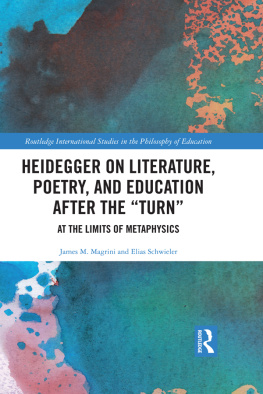
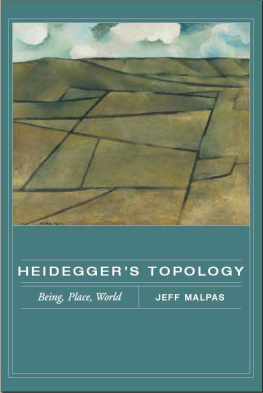
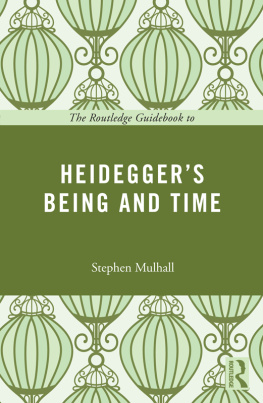
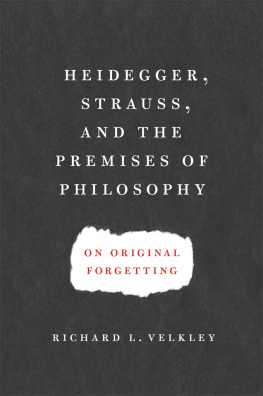
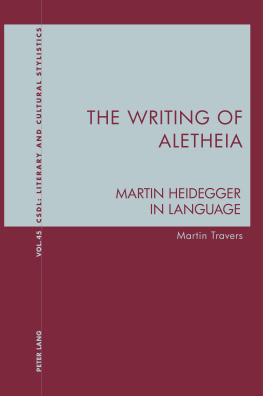
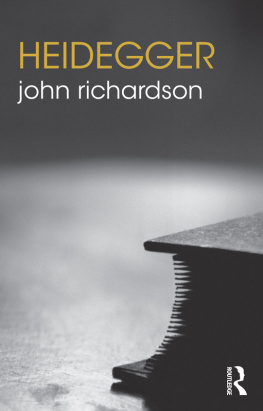
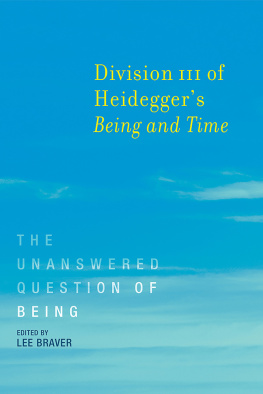
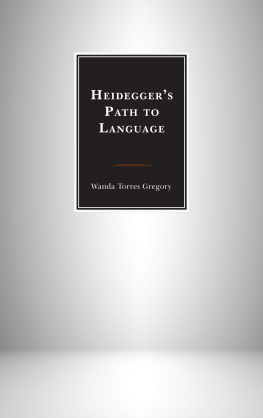

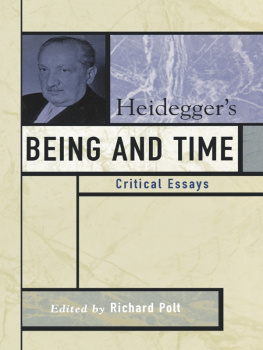
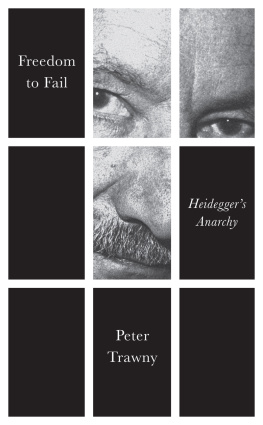

 The paper used in this publication meets the minimum requirements of the American National Standard for Information SciencesPermanence of Paper for Printed Library Materials, ANSI Z39.48-1992.
The paper used in this publication meets the minimum requirements of the American National Standard for Information SciencesPermanence of Paper for Printed Library Materials, ANSI Z39.48-1992.
